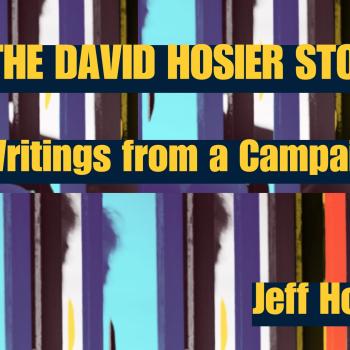
I recently wrote for Law and Liberty as part of a forum about Simone de Beauvoir’s The Second Sex, which reaches its 75th anniversary this year. My essay argued that this seminal work, which has had such a foundational and negative impact on modern feminism, is both intellectually weak and morally repugnant. But, in my criticism of Beauvoir and my establishment of myself to her “right” in reference to motherhood in particular (Beauvoir is repulsed by maternity, full stop) I was careful to make clear that there are also women far to my “right” in reference to motherhood, about whose totalizing conception of what it means to be a woman and a mother I feel no differently than Beauvoir does.
For Beauvoir, the false idea that “all mothers are saintly” forms a “religion of maternity.” Beauvoir says: “Like the woman in love, the mother is delighted to feel herself necessary; her existence is justified by the wants she supplies; but what gives mother love its difficulty and its grandeur is the fact that it implies no reciprocity…it is for her to justify it herself.”
This emotionally needy portrait of motherhood-as-martyrdom is recognizable to me, both in ancient tropes of the devouring mother and in modern representations thereof. But it does not resonate with my own experience as a mother of four, nor do I think that it resonates with the overall experiences of most mothers I know.
“Breast is Best”
There is one aspect of modern motherhood, however, where I think Beauvoir’s framework is onto something: the widespread belief among educated women across the ideological spectrum that “breast is best.”
This belief that breast milk is superior to formula for babies’ growth, development, and long-term well-being has been thoroughly debunked. At most, breast milk may marginally reduce gastrointestinal illnesses and ear infections in babies’ earliest months of life.
Beyond that, per economist Emily Oster, there is “no credible evidence” that breast milk has any effect on long-term health or IQ. The IQ relationship, for example, is entirely correlative: more educated mothers are more likely to breastfeed and to have higher IQs themselves.
Yet, this myth—breast is best—persists. Particularly among the educated (and, presumably, higher IQ) mothers who should understand the difference between causation and correlation.
Why?
Now, let me say at the outset that if breastfeeding my babies had come easily to me, and kept them satiated, I would have kept it going for much longer than I did. If I could have just fed my young babies from breast rather than from bottle (rather than having to pump breast milk that was then fed from a bottle) I would have done so. There would have been no reason not to, and I would have saved money on formula. So, granted: If a woman has a baby that latches well and a good supply of breastmilk, breast does indeed seem best.
My interest, though, is in why so many women like me, for whom breastfeeding is a struggle and ultimately a double time burden—those of us who are challenged with resistant babies or low supplies or anatomical difficulties—struggle and pump and fight to feed our babies with our own bodies for what is in fact, scientifically and unequivocally, virtually zero benefit to the baby.
I think it has something to do with that “religion of maternity” pointed out by Beauvoir.
A little over nine years ago, I had my first baby at 36 weeks gestation. In the research hospital where I gave birth to him, he (a hearty six-plus pounder despite his early arrival) and I (a 27-year-old, healthy and highly educated new mother) received excellent care. We also received visits from lactation consultants who lamented my son’s challenges with latching. They set him up with a contraption called an SNS cord that allowed him to consume formula while still attempting to latch. Every two hours, he nursed (fitfully, while consuming miniscule amounts of formula via the cable) for a half hour. Then, I pumped for a half hour. An hour later, we did that again. My son was fussy and always hungry. I was awake for 48 hours straight.
On our third day of this routine, my son’s bilirubin numbers rose enough that he had to be placed under blue lights. Bilirubin is reduced by babies’ consumption and elimination. The baby needed, first and foremost, to eat more. My husband and I (incidentally, both formula-fed babies) asked for the little hospital bottles of Similac. Our three-day-old son finally filled his stomach. He finally rested peacefully. My milk came in, and I began to pump one- and two-ounce bottles. We threw away the cable, and my son never nursed—and never went hungry—again.
When we got home, I continued to pump a fast-diminishing supply of breast milk for him, as an ever-greater percentage of his increasing daily intake became formula. I felt chained, trapped and resentful of the time it took to pump. Even without producing nearly enough to feed the baby and while offering him more formula than not, I did not have time to enjoy either my son or the things I had taken pleasure in before his arrival. I did not have time to unpack from my recent baby shower, to clean, to cook, or to enjoy visits with friends and family. It did not help that I had been in my job for just under a year, so I had no maternity leave. By the time my son was a few weeks old, I was hauling my pump on the train to work in the humid Philadelphia summer, sweating and leaking under my unseasonable cardigans and cotton maternity dresses on the long walk to the heavily airconditioned building where I was teaching “writing boot camp” to socioeconomically disadvantaged high schoolers. My husband had a generous paternity leave, and he dutifully tried to keep our newborn fed while putting together all the baby items and preparing for his new job.
When my son was just under six weeks old, I put away the pump.
And I felt shame. When I explained to friends (all fellow college grads and presumptive “breast is best” believers) why I was no longer pumping, I obfuscated how much formula my son had already been getting all along anyway. I focused on how hard I had tried, and how sad and guilty and sorry I was to “need” to stop. My friends were all—to a person—sympathetic and supportive.
But I did not exactly “need” to stop. I wanted to stop.
Although Emily Oster had not yet enlightened us all about the fraudulence of “breast is best,” the research was out there, and I had read it: Breast isn’t best. Breast is great if it works; so is formula. I knew this. I also knew, because I’d studied history and literature in school, that the idea of individual women all breastfeeding their own babies was relatively modern. There have always been women for whom breastfeeding was a struggle; there have not always been pumps and formula. So, women who struggled to breastfeed their babies in eras past would hire a wet nurse (if wealthy), trade farm chores with a sister or friend in exchange for nursing (if not wealthy), or watch their babies suffer and often die. The “religion of maternity” surrounding breastfeeding as an invaluable source of individualized nutrition and bonding is fairly new, historically speaking.
So, what exactly was I ashamed of?
In retrospect, it’s clear to me that I was cowed—in this way if in no other (see my thoughts on so-called gentle parenting)—by Beauvoir’s “religion of maternity,” in which a woman’s individual liberty must be as subsumed as possible by the demands of her child’s “best interest.” After all, motherhood without maximal self-sacrifice does not adequately qualify one for the club whose slogan reads “all mothers are saintly.” This is the club through membership in which educated mothers-by-choice differentiate ourselves as mothers from our less educated and working-class counterparts (many of whom may be mothers-by-accident).
For women to whom breastfeeding does not come easily, the myth of “breast is best” sets any amount of personal liberty in opposition to the baby’s best interest. In reality, of course, there is no such conflict. To act as though there is one—as I did my first summer as a mother—is to partake in an ultimately anti-natalist culture that manages to sanctify and denigrate motherhood at the same time.
After all, to the extent that women take Beauvoir’s view that motherhood is not a positive civic good but a mere personal choice—more like a college degree than like military service—and (unlike Beauvoir) want to become mothers anyway, they will feel the constant need to justify that choice. Why shoulder the optional, civically neutral expense of college to barely pass your classes? Why shoulder the optional, civically neutral burden of motherhood to sub-optimally nourish your child?
Baby Formula Feminism
Looking back at that summer nine years ago, I still feel shame.
But for a different reason: My faux capitulation to the false notion that “breast is best” was a missed opportunity to own and proactively celebrate the ways in which baby formula represents an unapologetically and genuinely feminist triumph. It more widely reconciles the positive social good of maternity with the positive social good of more mothers’ increased ability to partake in other aspects of social, civic, professional, and familial life.
Therefore, a feminism that embraces baby formula would be a feminism that more easily and emphatically embraces babies and families; and vice versa.
With my second and fourth children, respectively, I pumped some for several weeks, while supplementing with formula. I had weighed the hours of pumping about half a supply for these full-term seven-plus pounders (while keeping them fed and happy with as much formula as breast milk) against the miniscule likelihood that some early antibodies might ward off the preschool germs their older brothers were bringing into the house. I decided that optimizing between their best interests and those of the older kids meant something like pumping some, for a few weeks.
Even with this reduced pumping burden, the truth is that I probably should not have bothered. Even the reduced opportunity cost, after all, was high. But overweighted in my analysis was some amount of cynical catastrophizing: If my four-week-old baby got a fever, and I had to take him to the doctor, the medical professional would inevitably ask me: “breast fed?” I wanted to be able to answer in the affirmative. I was afraid that if I could not, I would be seen as a less than good mom, and my baby would therefore receive the kind of unintentionally less than good care too often offered to patients assumed not to know any better. “Breast is best,” I knew, had no purchase on reality. It might, however, be made to have such a purchase by a medical establishment that remains unscientifically pious—in this way if in no other—in Beauvoir’s “religion of maternity.”
When my third child came home from the hospital, though, the next oldest was four; there were no near-toddlers around. This baby was solidly over eight pounds. It was the tail end of winter, with hints of an early spring. I felt reasonably confident that we had a good shot of getting him through his earliest weeks illness free. So, I gave him some colostrum in the hospital, and then started filling him up solely on Similac the moment he got home.
As a result, he got a lot more maternal snuggles and attention during the newborn weeks than any of his brothers.
Want more women to have more babies? Want feminism to finally throw Beauvoir overboard and embrace maternity?
Baby formula feminism is the way to go.
















